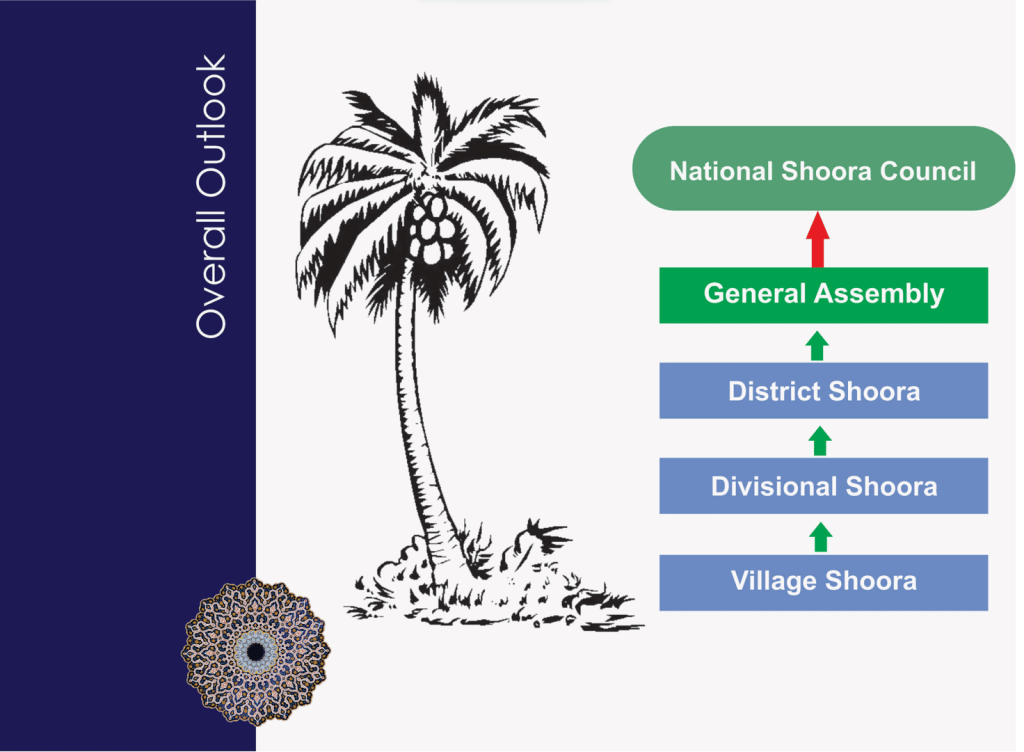Vision, Mission & Objectives
Overview
NSC was formed on 07 December 2013, at a gathering of Muslim civil society organizations, community leaders and intellectuals, to find solutions to constantly emerging challenges to the community due to multiple factors.
And consult them in the conduct of affairs [Al – Quran 3:159]
The concept of a consultation council originated from the guidance of Islamic teaching.
The core function of the NSC is to be a consultative platform providing all community stakeholders with the opportunity to discuss, communicate and corporate towards building consensus on issues that challenge the community and the country and develop necessary directives and guidelines for peaceful resolutions.
Vision
Achieving a center stage of leadership in the performance of the collective leadership for the Muslim community in Sri Lanka, and ensuring effective participation in all political, economic, social, educational, health and scientific fields and the relationship between Muslims and other communities.
Mission
Managing the affairs of Muslims with regard to their security and stability, defending their rights, preserving their identity, freedoms, cultures, and traditions, and making them aware of the values of good morals, social harmony, religious tolerance, and peaceful coexistence with the various local sects.

Aims and Objectives
- To stand united to defend the unity, integrity, and sovereignty of the motherland.
- To promote cooperation, consensus and unity on Muslim affairs.
- To encourage and contribute towards nation building, social security, sustainable development and enforcement of the rule of law in Sri Lanka.
- To work towards creating a better understanding of Islam and Muslims in the multi ethnic and pluralistic society of Sri Lanka.
- To work towards safeguarding and ensuring the rights of the Muslims.
- To work for the eradication of inequity and all forms of discrimination.
- To foster inter-community and inter-religious relations and work towards peace, co-existence and ethnic harmony.
- To foster consultation, cooperation and coordination with stake holders on matters pertaining to the general well-being, development and progress of the community and the country.
- To intervene in issues and situations that may adversely affect the Muslims and/or the country.
NSC’s Main Roles
- lobbying, guidance, awareness raising, networking, advocacy, facilitation, coordination, research and development, expert consultation.
The future of NSC
- NSC has proven its ability to work collectively on issues concerning the well-being and rights of the community, and issues that affect the common interests of the nation.
- NSC is striving to create a collective voice for the Muslim community in Sri Lanka.
Our governance
- As set out in our Constitution, the decision-making and ruling body of the NSC is its General Assembly that must meet at least once a year. The Assembly is composed of delegates representing member organizations.
- Every two years the General Assembly directly elects the Secretary-General and Deputy Secretary General roles, as well as approximately 60 individuals to the National Shoora Council.
- The National Shoora Council meets at least quarterly and is responsible for holding the NSC leadership team to account.
Characteristic of NSC
- It Is A Collective Independent Body Working For The Pleasure Of Allah To Promote Consultation, Cooperation And Coordination Within The Muslim Community As Well As Amongst The Communities In Sri Lanka.
- It Is A Broad-Based, Representative Body Of Muslims In Sri Lanka, Accommodating And Reflecting Nationally The Variety Of Social And Cultural Backgrounds, Views, Practices And Outlook Of The Community.
- It Is A Body That Will Base Its Policies And Decisions On Shoora Or Consensus And The Largest Practicable Measure Of Common Agreement.
- It Is A Formally Constituted Body With A System Of Representation And Accountability.
- It Is A Body That Will Seek To Draw On The Talents And Specialist Skills Of Individuals And The Strengths Of Organized Bodies To Meet The Great Challenges In Preparing The Case For, And Advocating, The Responsibilities, Safeguarding The Rights And Obligations Of Muslims Of Sri Lanka.
NSC Outlook

